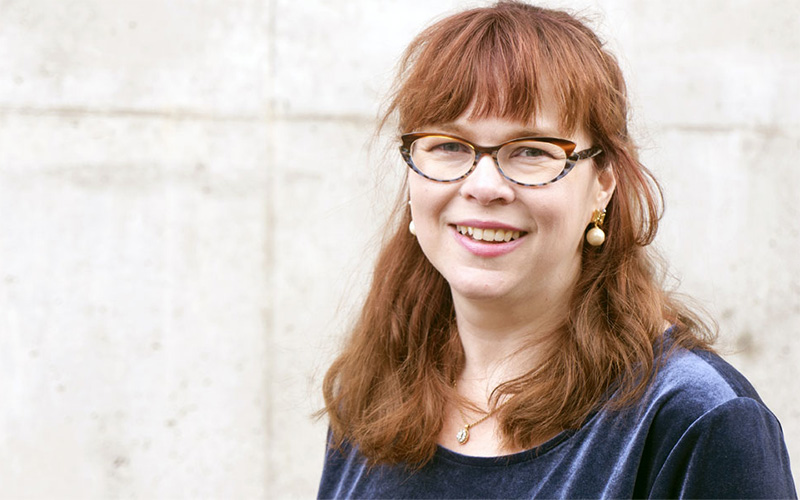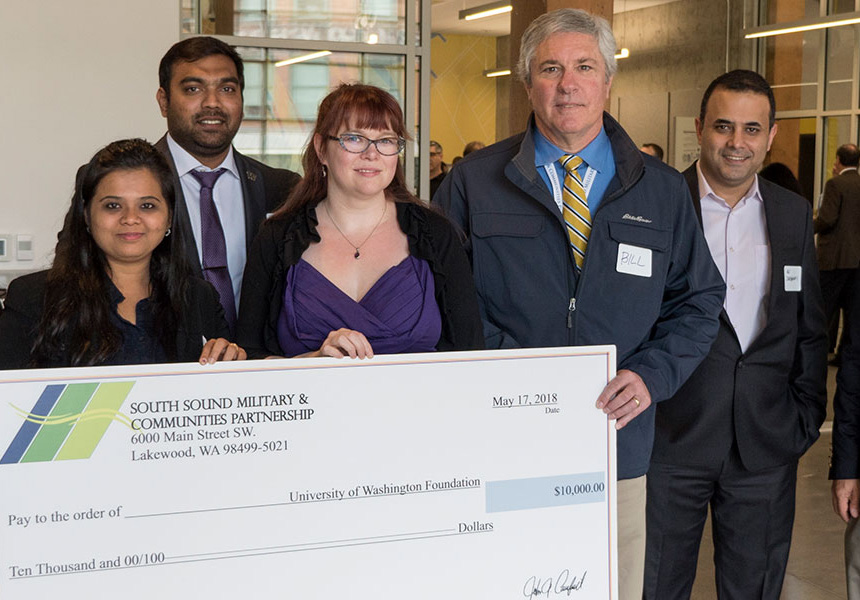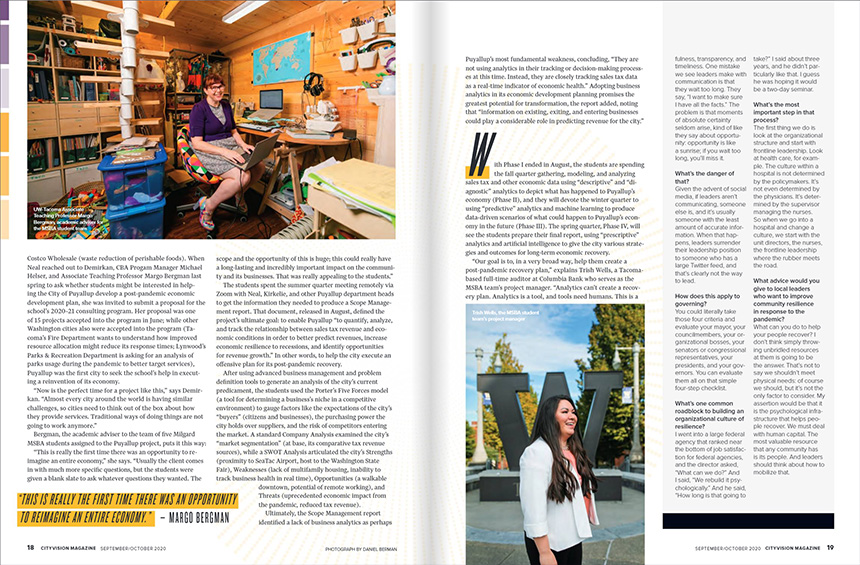
Open Book
Associate Teaching Professor Margo Bergman's love of knowledge led her to explore how systems work and how they can work better.
This Section's arrow_downward Theme Info Is:
- Background Image: ""
- Theme: "light-theme"
- Header Style: "purple_dominant"
- Card Height Setting: "consistent_row_height"
- Section Parallax: ""
- Section Parallax Height: ""
Associate Teaching Professor Margo Bergman “loves school.” Bergman earned both a master’s and Ph.D. in economics from the University of Houston as well as a Master of Public Health from UW Seattle. Bergman grew up in an education-rich environment. “Both of my grandmothers attended college, and one graduated with a degree in French.” she said. “My father, uncle and stepmother have master’s degrees and my mother has a bachelor’s degree.”
School is, in part, tactile — think fingers on a keyboard pounding out a research paper or the creak of textbooks opening for the first time. The sensory experience of learning appeals to Bergman, but what really motivates her is the pursuit of knowledge, i.e., the information between the squeaky binding. “I’m drawn to interesting questions and looking at how people make decisions around interesting questions,” she said.

Economics seems like a natural fit for someone with a passion for asking “why.” After all, the field concerns itself with examining the production, distribution and consumption of goods. Behind this broad definition lie any number of research directions one can take to better understand how people and organizations interact with the material world around them.
For a while, Bergman’s path seemed clear. She would teach economics courses at a college or university while also researching specific topics within her specialty. In 2007, Bergman learned she was pregnant with her second child. Finding out you’re about to have a child is a joyous occasion, one that is often accompanied by some happy tears, and it doesn’t matter whether or not you’re a first-time parent or you already have a few kids, the news is always special.
Bergman prepared for life as the mother of two children, but her plans were interrupted. “We learned that our unborn child had a genetic disorder and we were faced with what to do,” she said. “I was overwhelmed with the choices, and I’m a trained economist, so I started to wonder how the general population, who maybe didn’t have the skills I was given or who don’t have access to information that I had, could be expected to process this information and make informed choices for themselves.”
Bergman’s daughter passed away. The weeks and months following her daughter’s death were hard on Bergman. The pain and grief would slowly dissipate, but never fully go away. The tragedy did, over time, provide Bergman with a renewed sense of purpose.
In 2009, Bergman enrolled at UW Seattle to pursue a master’s in public health genetics. Not long after she started, the state legislature considered a proposal to cut funding for the program. “I went down to Olympia and told my story,” she said. “I think they thought my story was one of the more compelling ones and they [the legislature] decided not to cancel the degree.”
Bergman completed her degree in 2012. She built on her expertise by completing two postdocs, one in health services research through the Veterans Administration, the other in biomedical informatics through the UW School of Medicine. “I originally thought about becoming a genetic counselor,” she said. “My thinking shifted from wanting to work with individuals to wanting to be involved at a systemic level.”
The work of a genetic counselor can be deeply personal. A counselor works with parents at perhaps their most vulnerable moment. Bergman felt she needed more time to process and grieve. Still, she hasn't permanently shelved the idea of becoming a genetic counselor. “UW just started a genetic counseling program that interests me,” she said. For now, Bergman is interested in better understanding systems, including healthcare, and helping train students to identify underlying problems embedded in systems as well as exploring ways to root them out.
It’s this philosophy that lead Bergman to UW Tacoma in 2014. “At the time UWT was looking for someone who could bring a healthcare perspective to the MBA because they were starting a healthcare concentration,” she said.
Bergman didn’t waste any time getting started. She developed a course on health policy that is now taught to MBA students as well as graduate students in Nursing and Healthcare Leadership. Bergman’s knack for data and statistics drew the attention of Haluk Demirkan, director of the Center for Business Analytics (CBA) which came into being around the time Bergman came to campus.
Bergman co-developed curriculum for the master of science in business analytics. She also works with students as part of the CBA’s applied projects, which task students with helping businesses and other organizations solve real-world problems.
Outside of the classroom, Bergman is busy with her own research. In June 2020, she received a COVID-19 economic recovery research grant through the University of Washington’s Population Health Initiative to study why people chose to stay at home instead of going out. Bergman focused her work specifically on restaurants in Puyallup. The goal is to provide City of Puyallup leaders with information they can use to make decisions about economic and/or health policy.
The City of Puyallup teamed with Bergman and her students on an applied project to reimagine the city’s economy. “They were interested in finding out how they could diversify so that they’re in a better position the next time something like a pandemic happens,” said Bergman. Students looked at sales tax data in the city to identify potential trends. “Let’s say you have 10 years of steady sales tax revenue from a particular type of business,” she said. “Okay, let’s say the sales tax revenue starts to dip; then you’d want to figure out why that is and then have to make a decision to about what to do. Do you try and revive the industry or do you try and attract some other kind of business?”
Bergman’s students presented their findings to city officials. “The Washington State Fair is a big source of revenue for the City of Puyallup but students found other little spikes throughout the year in different sectors that city officials were excited to learn about,” said Bergman. “I think they see those sectors as potential growth opportunities.” The City has since put in an application for another applied project starting in the fall of 2021.

Bergman’s path has been circuitous but the destination has never been in doubt. If there’s knowledge to be had, that’s where you’ll find her. For some, learning is a thing to be done begrudgingly. Others may see education as a natural consequence of the human experience, something that happens but isn’t necessarily intriguing. Some get excited about a few things and throw themselves in, soaking up every ounce of knowledge about a particular subject. One gets the sense that Bergman doesn’t fit into these categories. In our conversation, she described herself as an open book. The phrase "open book" is meant to convey that someone is willing to talk about their life. Sharing one's experiences takes a fair amount of courage; you never know how people will react. The act of sharing is really just another form of teaching. Open books are meant to be read, the wisdom inside passing from person to person. Bergman's stories, the encyclopedia that is her life, are more than just stories — they're lessons. And what else should we expect from who loves school as much as Bergman does.
Recent news
Main Content
Gathering Strength
News Tags on this arrow_upward Story:
- None
Main Content
UW Tacoma Enrollment up 4% for Autumn 2024
News Tags on this arrow_upward Story:
- None
Main Content
Celebrating First Gen
News Tags on this arrow_upward Story:
- None



